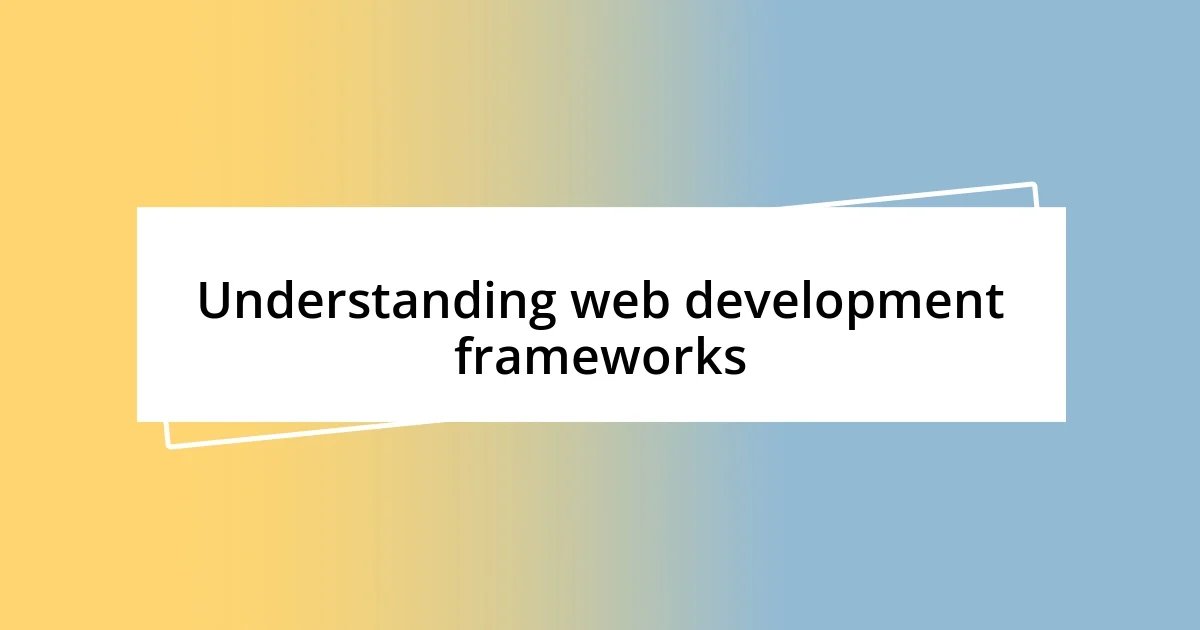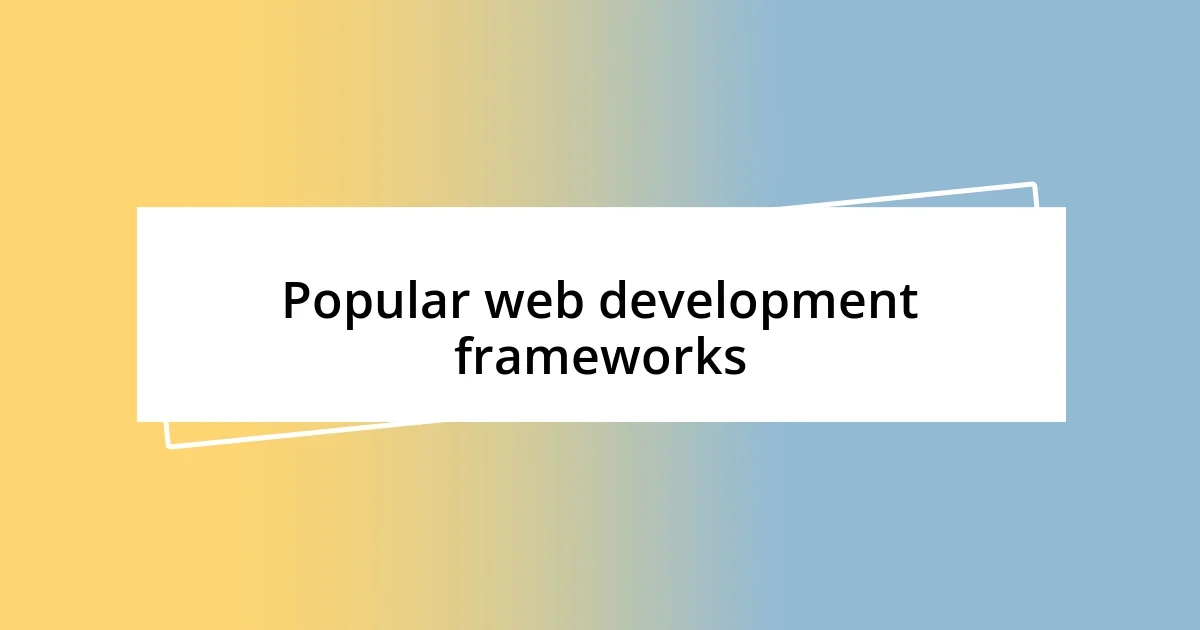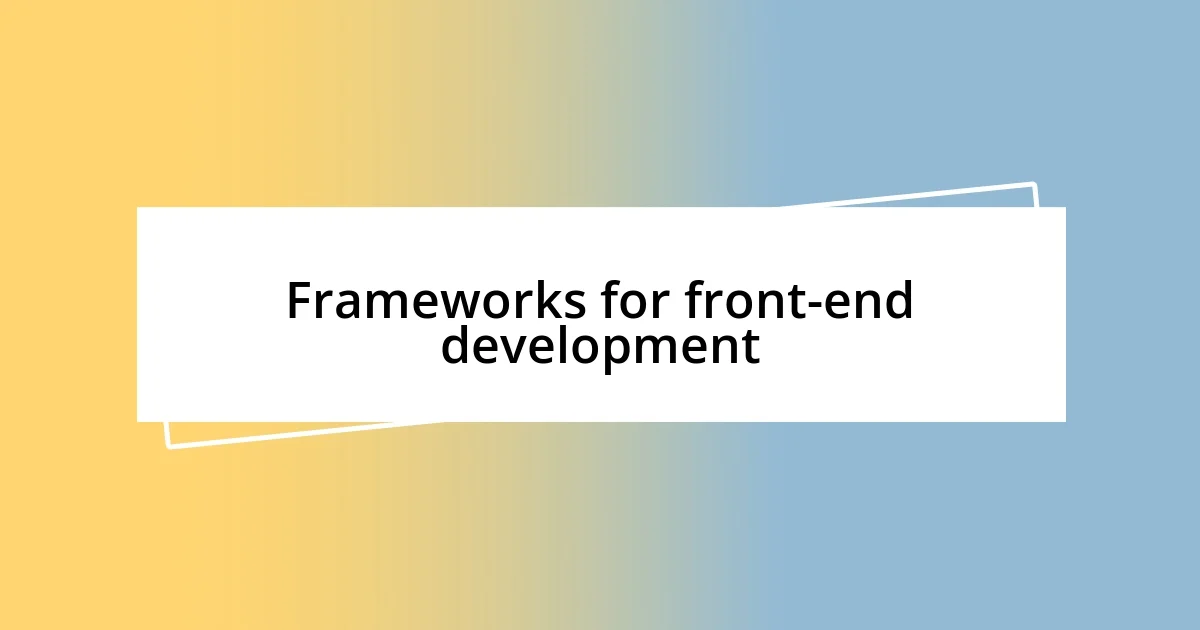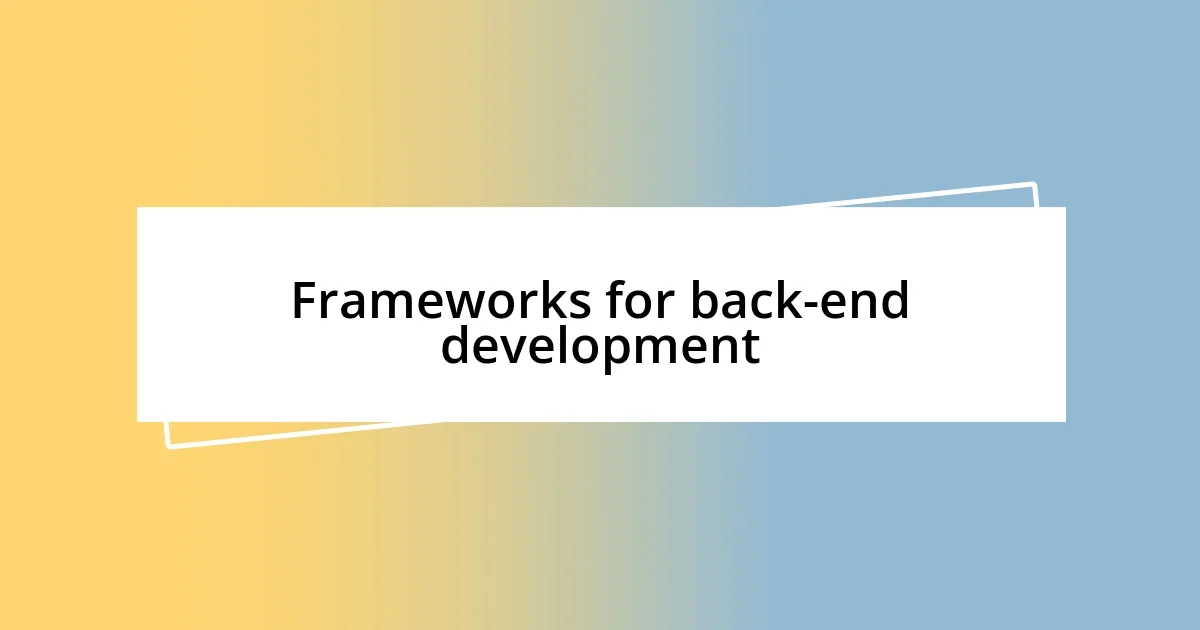Key takeaways:
- Web development frameworks streamline the coding process, enhancing efficiency and reducing debugging time by managing structure and dependencies.
- Framework selection influences project outcomes; understanding each framework’s strengths and community support is crucial in facilitating collaboration and problem-solving.
- Front-end frameworks like React and back-end frameworks like Node.js and Django enhance productivity and user experience, proving essential in dynamic application development.

Understanding web development frameworks
Web development frameworks are essentially tools that simplify the process of building web applications. I remember the first time I jumped into the world of frameworks; it felt like finding a shortcut in a dense forest. Instead of getting lost in endless lines of code, I could focus on what truly mattered—creating functional and visually appealing websites.
What strikes me most about these frameworks is how they promote efficiency and consistency. Have you ever spent hours debugging a small issue, only to realize it was due to a minor coding inconsistency? With frameworks, many of the tedious aspects, like structuring your code or managing dependencies, are handled for you. It’s like having a reliable friend guiding you through a complicated recipe!
Delving deeper, I’ve found that the choice of framework can significantly shape your development experience. For instance, I once worked on a project using React, and I was amazed by how its component-based architecture allowed for reusability and better organization. Have you ever experienced that moment when everything clicks, and the code flows smoothly? That’s the magic of frameworks—enabling developers to work more effectively and creatively.

Benefits of using frameworks
Using web development frameworks offers numerous benefits that can transform your workflow. One of my favorite advantages is the speed at which you can develop applications. The first time I used a framework, I was amazed at how quickly I could prototype a project. This rapid development cycle allows for swift iterations and promotes creativity. It’s like having a superpower that turns your ideas into reality almost instantly.
Here are some key benefits you might appreciate:
- Increased productivity: Frameworks provide pre-built components, letting you focus on unique features.
- Better collaboration: Standardized code makes it easier for teams to work together seamlessly.
- Improved security: Many frameworks come with built-in security features, helping protect against common vulnerabilities.
- Community support: Popular frameworks often have large communities, offering resources and troubleshooting help.
- Code maintainability: Consistent structure facilitates long-term maintenance and scalability of projects.
I’ve had experiences where community support has saved me lots of time. Once, while working on a tight deadline, a quick search in the framework’s community forums led me to a solution that would have taken me hours to figure out alone. In the fast-paced world of web development, that kind of support feels invaluable.

Popular web development frameworks
When exploring popular web development frameworks, each one has its unique flair and purpose. For example, Angular stands out with its robust features for building dynamic, single-page applications. I distinctly remember diving into Angular for the first time and feeling a bit overwhelmed by its extensive capabilities. But once I started to grasp its concepts, I appreciated how everything came together seamlessly—like a beautifully choreographed dance.
On the other hand, if you’re looking for something lightweight and flexible, you might find Vue.js to be a breath of fresh air. I recall a project where I had only a week to deliver a functional UI. Vue’s simplicity allowed me to produce results quickly without sacrificing quality. It felt like having a friendly guide ready to assist at every turn, which made the whole process enjoyable.
Here’s a quick comparison of some of the most popular frameworks in the industry:
| Framework | Use Case | Learning Curve |
|---|---|---|
| React | Building dynamic user interfaces | Medium |
| Angular | Single-page applications | High |
| Vue.js | Simpler applications, quick integrations | Low |
| Ruby on Rails | Rapid web application development | Medium |
| Django | Robust web applications, especially in Python | Medium |

Choosing the right framework
Choosing the right framework can feel daunting, given the multitude of options available. I vividly recall standing at the crossroads of selecting a framework for my first major project. I ultimately chose React, drawn in by its flexibility and the excitement of building dynamic user interfaces. But I can’t help but wonder—how do you determine which framework truly aligns with your project’s needs?
One key factor I always consider is the project’s complexity. For instance, during a time when I was tasked with creating a feature-rich, single-page application, Angular became my go-to choice. Its robust features not only powered my project but also helped me feel confident in my ability to deliver on time. I realized that understanding the specific strengths of each framework can significantly influence your development journey, guiding you toward successful outcomes.
Additionally, community support plays a crucial role in my framework selection process. I’ve found immense value in frameworks that foster strong communities. There was a point when I faced a particularly tricky bug, and a quick dive into the forums provided me the solution I needed within minutes. That experience reinforced my belief that choosing a framework is not just about immediate features, but also about the ongoing support network surrounding it. Which frameworks have you found most supportive? I’d love to hear your insights!

Frameworks for front-end development
Frameworks for front-end development can significantly shape your workflow and the outcome of your projects. Take React, for example. I remember diving into a collaborative project where we needed to build a complex dashboard. Its component-based architecture made it easy to break the UI into manageable parts. I felt a sense of empowerment, watching small pieces come together seamlessly to create a dynamic interface. It’s incredible how a framework can enhance not just performance but also collaborative spirit.
On the flip side, there’s Svelte, which I’ve recently started experimenting with. It’s fascinating how it compiles the components at build time instead of relying on a virtual DOM like React. I recall feeling a wave of relief when I noticed how snappy the final product was—no unnecessary overhead. Have you ever tried a new tool only to find yourself pleasantly surprised? The learning curve felt gentle, making me eager to dive deeper into Svelte’s features.
Then there’s Ember.js, which has a reputation for being opinionated, and honestly, I found that to be a double-edged sword. The structure can feel rigid at times, but I remember a project where that very structure kept our team coordinated and efficient. It removed a lot of guesswork, allowing us to focus more on delivering value. Remember, sometimes embracing a framework’s constraints can lead to unexpected creativity! Have you had experiences where limitations pushed you to innovate?

Frameworks for back-end development
When diving into back-end development, my experience with frameworks like Node.js has truly reshaped my approach to building applications. I recall when I built a real-time chat app, leveraging its asynchronous capabilities to manage multiple connections smoothly. The non-blocking nature of Node.js not only simplified my workflow but also created a fluid user experience that I was genuinely proud of. Have you ever experienced that moment when everything just clicks into place? It’s exhilarating!
Another framework that’s left a lasting impression on me is Django. My first encounter was during a web project requiring rapid deployment. Django’s built-in admin panel and robust ORM (Object-Relational Mapping) made data management a breeze. I still remember the satisfaction of watching my ideas quickly transform into a functioning product, eliciting the joy of seeing my hard work pay off. What’s your favorite moment of triumph in web development?
Laravel, too, has been a game-changer for me, particularly with its elegant syntax and a rich ecosystem of tools. While working on a project that required intricate routing and middleware, I felt reassured by its structured approach. That experience taught me how a good framework not only supports your current needs but also lays the groundwork for future scalability. Have you found a framework that made anticipating the next steps in your project much easier?














